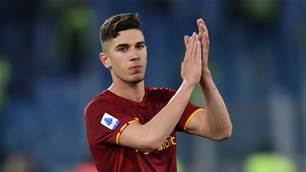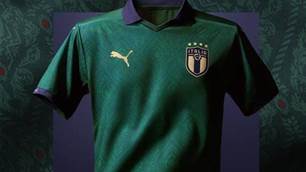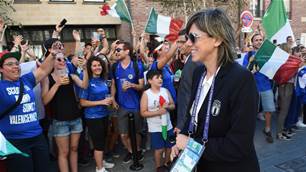He’s the enigmatic and injury-prone Buddhist who “cost” his Catholic country the World Cup. Yet the Divine Ponytail” – Italy’s most gifted player ever – remains a national hero to this day
Roberto Baggio was different. Not just a great footballer, he was, and remains, a complex man, a man whose life and career have been marked by contradiction and paradox. He was the pacifist whose transfer between clubs sparked riots, the animal-loving Buddhist who shoots ducks in his spare time.
He was a football rebel but a moral conservative who “let himself go” only once in his life, having a toke on a mate’s spliff at the age of 15.
Between 1982 and 2004, Baggio scored 317 goals in 697 matches. Some of them – like his slalom from the halfway line through the Czechoslovakia defence for Italy in the 1990 World Cup – are among the most beautiful in the history of the game. But he will always be remembered for a shot that he missed, the penalty that he skied against Brazil in Pasadena on 17 July 1994 that
stubbornly sticks in the mind. History tells us it was the penalty that cost Italy the World Cup, even though two team-mates, Franco Baresi and Daniele Massaro, had earlier missed in the shootout that followed 120 minutes of stalemate.
The image of Baggio, hands on hips, staring blankly at the ground, while Brazil keeper Claudio Taffarel, on his knees on the six-yard line, throws his arms to the heavens, is one of sport’s most iconic images.
It expresses the fine line between success and failure, triumph and despair, first and nowhere. It is the image that Baggio has spent the rest of his life trying to shut out.
But in that moment of loneliness and vulnerability, after a tournament in which he had single-handedly dragged Italy to the final, there is much of what made Baggio so fascinating. It was the genius allied to the apparent frailty that attracted people to him. In a sport that was increasingly dominated by muscle volume – something which would eventually get his third club, Juventus, into bother – he was a sylph-like presence, weaving improbable dances through opposition defences.
Baggio seemed to draw to himself intimations of the divine. When he grew his hair he became Il Divin Codino, “the Divine Ponytail”. One biography was entitled Toccato da Dio – “Touched by God”. His autobiography was called Una Porta nel Cielo – “A Door in the Sky”. The title was inspired by Italian songwriter, Lucio Dalla, who wrote: “When you watch Baggio play, you hear children. Baggio is the impossible made possible, a snowfall from an open door in the sky.”
It is tempting to think that the choice of title was a self-deprecating joke. “Porta” in Italian also means “goalposts”, prompting the inevitable quip that the “goalposts in the sky” must have been what Baggio was aiming for in Pasadena.
In his 22-year career, Baggio played for Italy 56 times, scoring in three consecutive World Cup finals, and turned out for seven clubs: Vicenza, Fiorentina, Juventus, AC Milan, Bologna, Inter Milan and Brescia. He won two Serie A titles, one UEFA Cup, and one Italian Cup. Many Italian players have more impressive CVs, but very few were so adored by the fans.
Ask Italians to identify the most naturally talented Italian player of all time and most will pick Baggio. Some older fans will go for the 1960s Milan playmaker, Gianni Rivera. Those with even longer memories usually nominate Giuseppe Meazza, the free-scoring Inter and Milan striker from the 1930s and ’40s, who gave his name to the stadium used by the two clubs. Gianni Brera, the doyen of Italian sportswriting for over 50 years, until his death in 1992, saw them all and put Baggio above Rivera, on a par with Meazza. “I had the good fortune to have seen Meazza,” he once wrote, “and I thought of him when I saw Baggio play. Baggio has fantasy.”
During his five seasons at Juventus, from 1990 to ’95, Baggio was frequently compared to Michel Platini, although it was a comparison that never convinced Platini. Like the Frenchman, Baggio wore the number 10 shirt coveted by the game’s most creative talents and Platini once remarked that Baggio wasn’t “a real number 10, more like a 9½”.
The press leapt on the comment, interpreting it as a put-down but Platini hadn’t meant it as a slight. “We spoke about it afterwards,” Baggio said. “It wasn’t a criticism but a statement of fact. I wasn’t a number 10 in the classic sense of the term. I wasn’t even a pure trequartista. I preferred to play further forward, often as an attacker, a number nine. So his definition was valid, original even.”
In his autobiography, when considering where to rank himself among football’s all-time greats, Baggio writes: Pele, Maradona, Baggio. But he quickly lowers his aim. “No, come on. Pele and Maradona are from another planet. I’m part of that group that is following them, and it’s a good group.” Indeed it is, with Baggio among a chasing pack that includes Platini, Cruyff, Best, Puskas and Di Stefano. In FIFA’s worldwide internet poll in 2000 to choose the greatest player of the 20th century, Baggio came fourth behind Maradona, Pele and Eusebio.
In 1993, while playing for Juventus, Baggio became only the third Italian player after Rivera and the 1982 World Cup hero, Paolo Rossi, to win France Football’s Ballon d’Or, or European Footballer of the Year award (Italy had to wait 13 years for another winner, when Fabio Cannavaro picked up the award after Italy’s World Cup success in 2006.) Baggio’s award was the culmination of a season in which Juventus won the UEFA Cup and confirmation of what fans of Juve and of his former clubs, Vicenza and Fiorentina, already knew – that here was a very special talent.
The extraordinary thing about Roberto Baggio is that we will never know what he was truly capable of because he spent most of his career crippled by injury. In fact, Baggio’s career was very nearly over before it had even begun.
When Fiorentina snapped him up in 1985, he was already being hailed as a prodigy. Every club in Italy had known about him since he was an 11-year-old playing for his local village team in Caldogno, near Vicenza, in the north east of Italy. At 13, he joined Vicenza, scoring 110 goals in 120 youth-team games before breaking into the first team. Juventus were confident that they’d won the race to sign him but, at the last minute, Fiorentina made an offer of nearly three billion lire, around £1.5 million.
Two days before the deal was announced, though, he shredded the cruciate ligament in his right knee playing against Rimini and had to have 220 stitches to rebuild it.
To his relief, Fiorentina honoured the contract but Baggio missed nearly all of the next two seasons and was dogged with serious knee problems ever after. After his retirement Baggio said that, on average, he had only been 100 percent fit for “three or four matches a season”.
It was during his long convalescence that Baggio’s life was transformed by his discovery of Buddhism. Born on 18 February, 1967, Baggio was the sixth of eight children in a typically Catholic family from Italy’s staunchly Catholic Veneto region. But religion was never more than a habit, one that he quickly lost when football started to take over his life. His conversion to Buddhism, after conversations with a Buddhist friend, Maurizio Boldrini, provided him with the perceptual framework to make sense of the suffering he was going through.
“I had lost faith in myself, went out very little and was feeling very melancholy. I started to read about Buddhism, then one day, on 1 January 1988, I knocked on Maurizio’s door at half past seven in the morning and said ‘I have to start my journey now’. I understood that I had to react. I had to find the courage to live. The road of faith was like a form of training in spiritual courage. Sometimes, during training, the pain in my knee was like a hammer in my brain but I never stopped. Others would have quit, I wouldn’t.”
Fit or otherwise, when he returned to first-team football at Fiorentina he quickly established himself as a favourite of the Viola fans. In the 1987-88 season, he played 27 league games, scoring six times. The following season he played 30 times, scoring 15 times. It wasn’t just the number of goals but their quality and variety that was enrapturing the Artemio Franchi stadium. The late Miguel Montuori, the Argentinian midfielder who won the league with Fiorentina in 1956, made the claim in the 1988-89 season that Baggio was “more productive than Maradona [for Napoli]. He is without doubt the best number 10 in the league and he still has so much to give, still has room for improvement.”
In May 1990, against his will, Fiorentina sold Baggio to their bitter rivals, Juventus. When Fiorentina made the announcement, hundreds of fans took to the streets of the Renaissance city in protest, trashing cars and shops and pretty much anything they could get their hands on. It took 350 riot police to restore order. Baggio, in hiding up the road at Coverciano, where Italy were preparing for the World Cup, was sickened by the violence but more upset that the fans – following club briefings that he had left for more money – were calling him “Judas”.
At Juventus, in 1995, Baggio won the first of his two league title medals but it was also here that he was to meet Marcello Lippi, the one person in football who can move Baggio to unfiltered outpourings of some pretty un-Buddhist sentiments.
Baggio played for 18 coaches in his career. He still speaks highly of many of them, including Carlo Mazzone (Brescia), Gigi Maifredi (Juventus) and Sven Goran Eriksson (Fiorentina). Not all of them “got” Baggio. Those who were unconvinced that his mercurial talent could be harnessed for the good of the team included coaching giants Arrigo Sacchi and Fabio Capello. At the time, Baggio was frustrated by his frequent substitutions but later came to understand both men.
With Lippi it was different. Baggio was to play a second season under Lippi, at Inter Milan in 1999-2000, a period which, according to the player, inflamed a naked animosity between the two. “The Lippi that I had at Inter declared war on me, without stopping for a minute, without any plausible motivation, without any of it having sense, an understandable logic. The problem was that even when I didn’t play, I was always on people’s lips whereas Lippi, try as he might, just couldn’t make people like him and he couldn’t accept all this. He wanted to destroy me, to annihilate me, but he didn’t succeed.”
Baggio recounts the story of an Inter training session: “During one match, I played a 40-yard pass to free Bobo Vieri, who scored. He turned round and applauded me, so did Christian Panucci. It was a normal thing between team-mates. But Lippi went crazy. ‘Vieri, Panucci, what the fuck do you think you’re doing? Do you think this is the theatre? We’re not here to clap each other, we’re here to work!’ And people ask me if I’m surprised that he was sacked by Inter!”
For all his years playing for the Azzurri and for major clubs like Juve, Milan and Inter, Baggio’s most treasured achievement came in the colours of humble Brescia in the 2000-01 season. Coach Mazzone had brought in the 33-year-old with plans to build the team around him but yet another injury caused the player to miss the first half of a season in which Brescia were rooted to the foot of Serie A. Baggio returned on February 24 to score two goals against his old club, Fiorentina. He scored a further eight goals during an incredible run-in as Brescia finished seventh and qualified for the Intertoto Cup. It was a little football miracle, a “divine” intervention.
Baggio retired at the end of the 2003-04 season and, to a large extent, has disappeared off the radar. He doesn’t give interviews, doesn’t play the pundit on football shows, and is never photographed tumbling out of nightclubs at three in the morning.
These days Baggio divides his time between hunting on his ranch in Argentina (he squares shooting animals with his Buddhist faith by saying “to really live with nature you have to do more than contemplate it”) and travelling the world to promote humanitarian causes, with his faith still very much the cornerstone of his life. Like a Bono of world football, he is dedicated to helping eradicate world poverty, describing his role as goodwill ambassador for the Food and Agriculture Organisation of the United Nations as a “moral, personal and professional obligation”.
His close-cropped hair and neat beard-moustache combo are now more grey than black and he looks decidedly older than his 41 years, something he puts down to the injuries he suffered during his career. “I sometimes play football with my children,” he says. “When I see the ball, the old passion comes out but I have to be careful not to get carried away. Even playing with them, I’m still terrified of injuring myself.”
For the moment, he is able to assuage the old passion with a new love: Argentinian football. He can be found watching Boca Juniors at La Bombonera in Buenos Aires. He sees in the Argentine game the youthful spontaneity that marked his days at Vicenza. “When I started playing in the first team at 16 it was seen as strange to have someone so young. But in Argentina, clubs can only survive through developing their youth set-ups, so they have players in the first team from 15 or 16 years of age. Everybody talks about Sergio Aguero playing for Atletico Madrid at the age of 18. But he’d already played three full seasons in Argentina. That could never happen in Italy.”
Towards the end of his career, Baggio toyed with the idea of going into youth coaching, convinced that he would be able to transmit healthy values – and one or two tricks – to the next generation. But that didn’t happen and he began expressing increasing cynicism about Italian football and the way that it has been overtaken by commercial interests.
However, a return to calcio in some shape or form should not be ruled out and his name has been linked with both Juve and Inter. The itch is clearly still there. “Life after football is different,” he tells the camera on his blog, “there’s less stress and more time to spend with the family…” Then the voice trails off, as if he’s not entirely convinced that life after football is such a good thing after all.
This article appeared in the October edition of Australian FourFourTwo Magazine. To subscribe at a special online rate, click here
Related Articles

Aussie young gun nets winner for Italy at Euros U19s

PUMA release commemorative Italian 'renaissance' kit













